 Backend Development
Backend Development
 Python Tutorial
Python Tutorial
 An explanation of the implementation method of Python+OpenCV image style migration
An explanation of the implementation method of Python+OpenCV image style migration
An explanation of the implementation method of Python+OpenCV image style migration
This article brings you an explanation of the implementation method of Python OpenCV image style migration. It has certain reference value. Friends in need can refer to it. I hope it will be helpful to you.
Many people now like to take photos (selfies). You will get tired of playing with the limited filters and decorations too much, so there are apps that provide imitate famous painting styles functions, such as prisma, versa, etc., which can turn your photos into Van Gogh, The styles of masters such as Picasso and Munch.
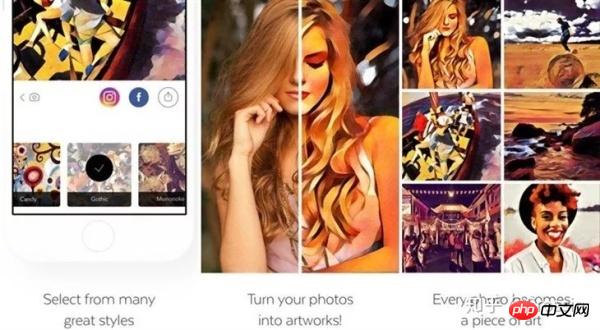
This function is called "Image Style Transfer", which is almost all based on the CVPR 2015 paper "A It was developed based on the algorithms proposed in Neural Algorithm of Artistic Style and the ECCV 2016 paper "Perceptual Losses for Real-Time Style Transfer and Super-Resolution", as well as subsequent related research.
In layman's terms, it is to use neural network to pre-train the styles in famous paintings into models, and then apply them to different photos to generate new stylized images.
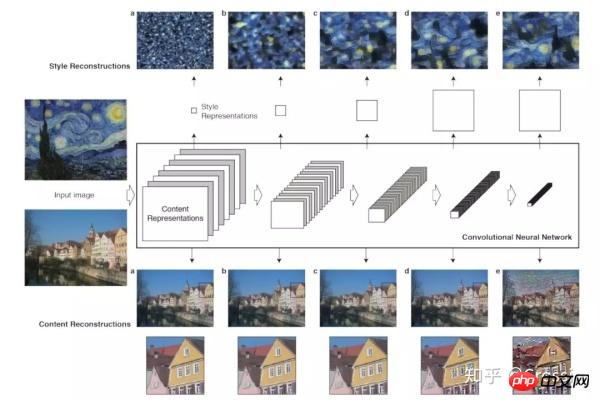
From "A Neural Algorithm of Artistic Style"
And because neural networks are increasingly used in computer vision , the famous visual development library OpenCV officially introduced DNN (Deep Neural Network) in version 3.3, supporting models of mainstream frameworks such as Caffe, TensorFlow, Torch/PyTorch, etc., which can be used to realize image recognition, detection, and classification , segmentation, coloring and other functions.
I just recently discovered that there is a Python example of image style transfer in OpenCV's Sample code (forgive my hindsight), which is based on the network model implementation in the ECCV 2016 paper. Therefore, even as a novice in artificial intelligence, you can play with models trained by others and experience the wonders of neural networks.
(See the end of the article for relevant codes and models)
OpenCV official code address: https://github.com/opencv/opencv/blob/3.4.0/samples/dnn/fast_neural_style Run the code by executing the command in the .py
directory:
python fast_neural_style.py --model starry_night.t7
model The parameter is to provide the path to the pre-trained model file. OpenCV does not provide downloading, but the You can find it in the reference project https://github.com/jcjohnson/fast-neural-style
Other settable parameters are:
inputYou can specify the original image/video. If not provided, the camera will be used to capture it in real time by default.width,height, adjust the size of the processed image, setting it smaller can improve the calculation speed. On my own computer, 300x200 converted video can reach 15 fps.median_filterThe window size of the median filter is used to smooth the result image. This has little impact on the result.
The effect after execution (taken from jcjohnson/fast-neural-style):

Original Image
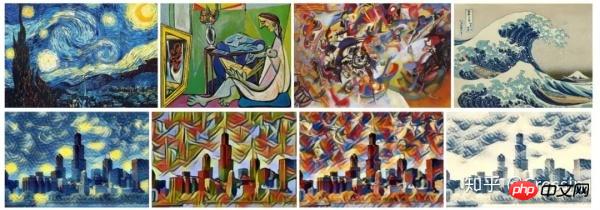
ECCV16 models
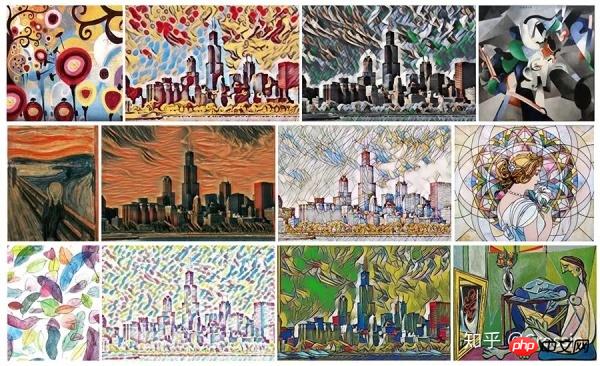
Load the model-> Read the image-> Calculate-> Output the image, I further simplified it based on the official example:
import cv2
# 加载模型
net = cv2.dnn.readNetFromTorch('the_scream.t7')
net.setPreferableBackend(cv2.dnn.DNN_BACKEND_OPENCV);
# 读取图片
image = cv2.imread('test.jpg')
(h, w) = image.shape[:2]
blob = cv2.dnn.blobFromImage(image, 1.0, (w, h), (103.939, 116.779, 123.680), swapRB=False, crop=False)
# 进行计算
net.setInput(blob)
out = net.forward()
out = out.reshape(3, out.shape[2], out.shape[3])
out[0] += 103.939
out[1] += 116.779
out[2] += 123.68
out /= 255
out = out.transpose(1, 2, 0)
# 输出图片
cv2.imshow('Styled image', out)
cv2.waitKey(0)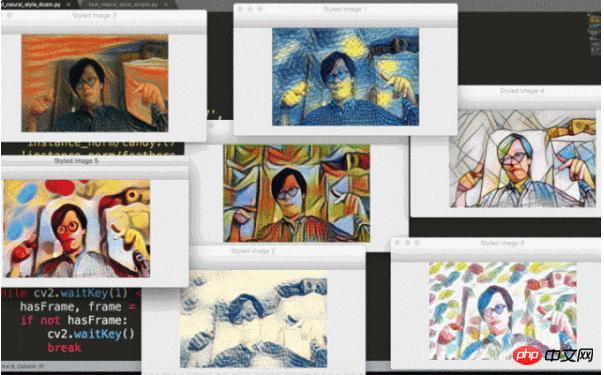
PS: When I watched Zhao Lei’s concert two days ago, I also said: There are a lot of background MVs for his concerts The use of image binarization, edge detection and other operations reminds me of the big assignments in digital image processing classes in the past... Now that the efficiency of image style transfer has reached real-time, I believe it will be used frequently in the future.
The above is the detailed content of An explanation of the implementation method of Python+OpenCV image style migration. For more information, please follow other related articles on the PHP Chinese website!

Hot AI Tools

Undresser.AI Undress
AI-powered app for creating realistic nude photos

AI Clothes Remover
Online AI tool for removing clothes from photos.

Undress AI Tool
Undress images for free

Clothoff.io
AI clothes remover

Video Face Swap
Swap faces in any video effortlessly with our completely free AI face swap tool!

Hot Article

Hot Tools

Notepad++7.3.1
Easy-to-use and free code editor

SublimeText3 Chinese version
Chinese version, very easy to use

Zend Studio 13.0.1
Powerful PHP integrated development environment

Dreamweaver CS6
Visual web development tools

SublimeText3 Mac version
God-level code editing software (SublimeText3)

Hot Topics
 1387
1387
 52
52
 Is the vscode extension malicious?
Apr 15, 2025 pm 07:57 PM
Is the vscode extension malicious?
Apr 15, 2025 pm 07:57 PM
VS Code extensions pose malicious risks, such as hiding malicious code, exploiting vulnerabilities, and masturbating as legitimate extensions. Methods to identify malicious extensions include: checking publishers, reading comments, checking code, and installing with caution. Security measures also include: security awareness, good habits, regular updates and antivirus software.
 How to run programs in terminal vscode
Apr 15, 2025 pm 06:42 PM
How to run programs in terminal vscode
Apr 15, 2025 pm 06:42 PM
In VS Code, you can run the program in the terminal through the following steps: Prepare the code and open the integrated terminal to ensure that the code directory is consistent with the terminal working directory. Select the run command according to the programming language (such as Python's python your_file_name.py) to check whether it runs successfully and resolve errors. Use the debugger to improve debugging efficiency.
 Can vs code run in Windows 8
Apr 15, 2025 pm 07:24 PM
Can vs code run in Windows 8
Apr 15, 2025 pm 07:24 PM
VS Code can run on Windows 8, but the experience may not be great. First make sure the system has been updated to the latest patch, then download the VS Code installation package that matches the system architecture and install it as prompted. After installation, be aware that some extensions may be incompatible with Windows 8 and need to look for alternative extensions or use newer Windows systems in a virtual machine. Install the necessary extensions to check whether they work properly. Although VS Code is feasible on Windows 8, it is recommended to upgrade to a newer Windows system for a better development experience and security.
 Can visual studio code be used in python
Apr 15, 2025 pm 08:18 PM
Can visual studio code be used in python
Apr 15, 2025 pm 08:18 PM
VS Code can be used to write Python and provides many features that make it an ideal tool for developing Python applications. It allows users to: install Python extensions to get functions such as code completion, syntax highlighting, and debugging. Use the debugger to track code step by step, find and fix errors. Integrate Git for version control. Use code formatting tools to maintain code consistency. Use the Linting tool to spot potential problems ahead of time.
 Choosing Between PHP and Python: A Guide
Apr 18, 2025 am 12:24 AM
Choosing Between PHP and Python: A Guide
Apr 18, 2025 am 12:24 AM
PHP is suitable for web development and rapid prototyping, and Python is suitable for data science and machine learning. 1.PHP is used for dynamic web development, with simple syntax and suitable for rapid development. 2. Python has concise syntax, is suitable for multiple fields, and has a strong library ecosystem.
 Can vscode be used for mac
Apr 15, 2025 pm 07:36 PM
Can vscode be used for mac
Apr 15, 2025 pm 07:36 PM
VS Code is available on Mac. It has powerful extensions, Git integration, terminal and debugger, and also offers a wealth of setup options. However, for particularly large projects or highly professional development, VS Code may have performance or functional limitations.
 Can vscode run ipynb
Apr 15, 2025 pm 07:30 PM
Can vscode run ipynb
Apr 15, 2025 pm 07:30 PM
The key to running Jupyter Notebook in VS Code is to ensure that the Python environment is properly configured, understand that the code execution order is consistent with the cell order, and be aware of large files or external libraries that may affect performance. The code completion and debugging functions provided by VS Code can greatly improve coding efficiency and reduce errors.
 Golang vs. Python: Concurrency and Multithreading
Apr 17, 2025 am 12:20 AM
Golang vs. Python: Concurrency and Multithreading
Apr 17, 2025 am 12:20 AM
Golang is more suitable for high concurrency tasks, while Python has more advantages in flexibility. 1.Golang efficiently handles concurrency through goroutine and channel. 2. Python relies on threading and asyncio, which is affected by GIL, but provides multiple concurrency methods. The choice should be based on specific needs.



